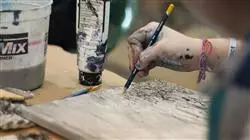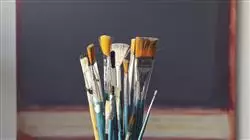University certificate
The world's largest faculty of education”
Introduction to the Program
This Postgraduate diploma in Methodology and Teaching of Art History in High School will generate a sense of confidence in the performance of your profession, which will help you grow personally and professionally"

The advantage of successfully completing this online program for those who take it is firstly, the ease and access to personalized tutoring and all kinds of help and advice; in addition to having, at any time and place, the resources provided, being able to have greater autonomy in learning and carrying out the proposed practices.
It considered that teachers should be aware of the course of their discipline over time and the various legislative changes that have occurred in education, thereby seeking to improve their skills when teaching a constantly changing and evolving student body.
Precisely, in the search for the updating of teachers, this Postgraduate diploma offers a special treatment with ICTs, so current in our educational system and that are a very attractive vehicle to access the students.
In addition, by learning more about the different methodological and evaluative techniques, the educator will be able to develop the necessary capacity to establish a satisfactory teaching-learning process with the student.
Teaching Art History is a task of great responsibility, because it is a subject that is linked as a complement to teaching History, knowledge of the past to the present and future, as well as the understanding of the environment or more immediate history as the most distant. Art history as a discipline aims to help cultivate aesthetic sensibility, fundamental to develop intellectual abstraction. Behind each piece of work, there are many elements, and the search and identification of these elements makes it an indispensable knowledge for high school students.
This Postgraduate diploma offers numerous studies that the teacher of Art History will need to perform their work, looking for innovation and based on practical elements that will have an impact on the work in the classroom. We seek the professional success of those who study this Postgraduate diploma that will result in the improvement of the educational system and, consequently, of society itself.
Update your knowledge through the Postgraduate diploma in Methodology and Teaching of Art History in High School ”
The Postgraduate diploma in Methodology and Teaching of Art History in High School contains the most complete and up-to-date educational program on the market. The most important features include:
- 75 case studies presented by experts in Methodology and Teaching of Art History in High School
- The graphic, schematic, and practical contents with which they are created provide scientific and practical information on the disciplines that are essential for professional practice
- Latest news on Methodology and Teaching of Art History in High School
- It contains practical exercises where the self assessment process can be carried out to improve learning
- With special emphasis on innovative methodologies in Methodology and Teaching of Art History in High School
- All of this will be complemented by theoretical lessons, questions to the expert, debate forums on controversial topics, and individual reflection assignments
- Content that is accessible from any fixed or portable device with an Internet connection
This Postgraduate diploma may be the best investment you can make when selecting a refresher program, for two reasons: in addition to updating your knowledge in Methodology and Teaching of Art History in High School , you will obtain a qualification from TECH Global University”
It includes in its teaching staff professionals belonging to the field of Methodology and Teaching of Art History in High School , who pour into this program the experience of their work, in addition to recognized specialists belonging to reference societies and prestigious universities.
The multimedia content developed with the latest educational technology will provide the professional with situated and contextual learning, i.e., a simulated environment that will provide an immersive program to learn in real situations.
The design of this programme is based on problem-based learning, whereby the teacher must try to solve the different professional practice situations that arise during the course. For this purpose, the teachers will be assisted by an innovative interactive video system developed by recognized experts in the field of Methodology and Teaching of Art History in High School with extensive teaching experience.
Increase your decision-making confidence by updating your knowledge with this Postgraduate diploma"

Take the opportunity to learn about the latest advances in Methodology and Teaching of Art History in High School and improve the education of your students"
Why study at TECH?
TECH is the world’s largest online university. With an impressive catalog of more than 14,000 university programs available in 11 languages, it is positioned as a leader in employability, with a 99% job placement rate. In addition, it relies on an enormous faculty of more than 6,000 professors of the highest international renown.

Study at the world's largest online university and guarantee your professional success. The future starts at TECH”
The world’s best online university according to FORBES
The prestigious Forbes magazine, specialized in business and finance, has highlighted TECH as “the world's best online university” This is what they have recently stated in an article in their digital edition in which they echo the success story of this institution, “thanks to the academic offer it provides, the selection of its teaching staff, and an innovative learning method aimed at educating the professionals of the future”
A revolutionary study method, a cutting-edge faculty and a practical focus: the key to TECH's success.
The most complete study plans on the university scene
TECH offers the most complete study plans on the university scene, with syllabuses that cover fundamental concepts and, at the same time, the main scientific advances in their specific scientific areas. In addition, these programs are continuously being updated to guarantee students the academic vanguard and the most in-demand professional skills. In this way, the university's qualifications provide its graduates with a significant advantage to propel their careers to success.
TECH offers the most comprehensive and intensive study plans on the current university scene.
A world-class teaching staff
TECH's teaching staff is made up of more than 6,000 professors with the highest international recognition. Professors, researchers and top executives of multinational companies, including Isaiah Covington, performance coach of the Boston Celtics; Magda Romanska, principal investigator at Harvard MetaLAB; Ignacio Wistumba, chairman of the department of translational molecular pathology at MD Anderson Cancer Center; and D.W. Pine, creative director of TIME magazine, among others.
Internationally renowned experts, specialized in different branches of Health, Technology, Communication and Business, form part of the TECH faculty.
A unique learning method
TECH is the first university to use Relearning in all its programs. It is the best online learning methodology, accredited with international teaching quality certifications, provided by prestigious educational agencies. In addition, this disruptive educational model is complemented with the “Case Method”, thereby setting up a unique online teaching strategy. Innovative teaching resources are also implemented, including detailed videos, infographics and interactive summaries.
TECH combines Relearning and the Case Method in all its university programs to guarantee excellent theoretical and practical learning, studying whenever and wherever you want.
The world's largest online university
TECH is the world’s largest online university. We are the largest educational institution, with the best and widest online educational catalog, one hundred percent online and covering the vast majority of areas of knowledge. We offer a large selection of our own degrees and accredited online undergraduate and postgraduate degrees. In total, more than 14,000 university degrees, in eleven different languages, make us the largest educational largest in the world.
TECH has the world's most extensive catalog of academic and official programs, available in more than 11 languages.
Google Premier Partner
The American technology giant has awarded TECH the Google Google Premier Partner badge. This award, which is only available to 3% of the world's companies, highlights the efficient, flexible and tailored experience that this university provides to students. The recognition as a Google Premier Partner not only accredits the maximum rigor, performance and investment in TECH's digital infrastructures, but also places this university as one of the world's leading technology companies.
Google has positioned TECH in the top 3% of the world's most important technology companies by awarding it its Google Premier Partner badge.
The official online university of the NBA
TECH is the official online university of the NBA. Thanks to our agreement with the biggest league in basketball, we offer our students exclusive university programs, as well as a wide variety of educational resources focused on the business of the league and other areas of the sports industry. Each program is made up of a uniquely designed syllabus and features exceptional guest hosts: professionals with a distinguished sports background who will offer their expertise on the most relevant topics.
TECH has been selected by the NBA, the world's top basketball league, as its official online university.
The top-rated university by its students
Students have positioned TECH as the world's top-rated university on the main review websites, with a highest rating of 4.9 out of 5, obtained from more than 1,000 reviews. These results consolidate TECH as the benchmark university institution at an international level, reflecting the excellence and positive impact of its educational model.” reflecting the excellence and positive impact of its educational model.”
TECH is the world’s top-rated university by its students.
Leaders in employability
TECH has managed to become the leading university in employability. 99% of its students obtain jobs in the academic field they have studied, within one year of completing any of the university's programs. A similar number achieve immediate career enhancement. All this thanks to a study methodology that bases its effectiveness on the acquisition of practical skills, which are absolutely necessary for professional development.
99% of TECH graduates find a job within a year of completing their studies.
Postgraduate Diploma in Methodology and Teaching of Art History in High School
If you are passionate about art history and want to transmit that love of knowledge to your students, the Postgraduate Diploma in Methodology and Teaching of Art History in High School at TECH Global University is the opportunity you've been waiting for. Our online classes give you the convenience and flexibility to study from anywhere and at any time. Discover the benefits of online education, where you can access interactive multimedia resources, participate in virtual discussions, and receive personalized feedback from our art history experts.
Discover the benefits of online education.
Encourage art history learning with innovative approaches
In the Postgraduate Diploma in Methodology and Teaching of Art History in High School, you will explore innovative pedagogical approaches to teach art history in an engaging and meaningful way. You will learn to design didactic strategies that encourage the active participation of your students, promoting critical analysis, aesthetic appreciation and the development of creative thinking skills. TECH Global University has a team of highly qualified teachers committed to providing you with a quality educational experience. Through our program, you will acquire the necessary tools to plan and develop didactic units that adapt to the needs of your students, using digital resources, online visits to museums and other technological tools. Stand out as an art history teacher in secondary and high school education and transform the way your students appreciate and understand art. Our program will allow you to develop your creativity and pedagogical skills to provide an enriching and memorable learning experience. Don't miss the opportunity to make a difference in the teaching of art history. Enroll in the Postgraduate Diploma in Methodology and Teaching of Art History in High School from TECH Global University and become a reference teacher in the art world!







